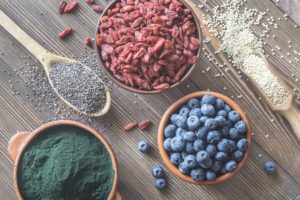 When you see a commercial for a new fancy car with a hot color and all the bells and whistles, do you think you need it? You might think it would be nice to drive but soon realize that almost every other car will do the same thing.
When you see a commercial for a new fancy car with a hot color and all the bells and whistles, do you think you need it? You might think it would be nice to drive but soon realize that almost every other car will do the same thing.
Exotic, expensive, and imported “superfoods” are pretty much the same thing. They may offer higher per serving concentrations of certain nutrients, but for the most part aren’t delivering anything that you can’t already get at your local produce shop.
Advertisement
Don’t get me wrong: goji and acai berries, along with quinoa, are nutritional heavy hitters. But when it comes to cost and the proposed benefits of branded “superfoods,” the differences are negligible. If you prefer the taste and price of blueberries and strawberries, for example, you’re no worse off.
Really, eating a nutrient-dense diet with a variety of foods of varying colors is the best way to protect yourself from illness and promote health. The idea of a “superfood” can actually be dangerous in some regard. It can provide false hope that including a particular type of berry into a milkshake or smoothie can somehow offer benefits even if the majority of food intake has low nutritional value.
This is not a knock on superfoods—they are great, nutrient dense foods—but they are not required for better health. If anything, this is about showing that you don’t need to spend money on imported goji berries—blueberries will do!
It might not seem as cool, but blueberries, broccoli, onions, garlic, and oats can be superfoods too. Any vegetable, fruit, whole grain, dairy, fish, or unprocessed meat has nutrients essential for functionality and overall health. Leafy greens and colorful fruits, legumes, and nuts are very nutrient-dense and promote countless health benefits.
The reality is that overall health is a result of the sum of several nutritional parts. Virtually all of the foods listed above are associated with several health benefits including improved heart health, better cognitive function, lower blood sugar, and longer, healthier life!
